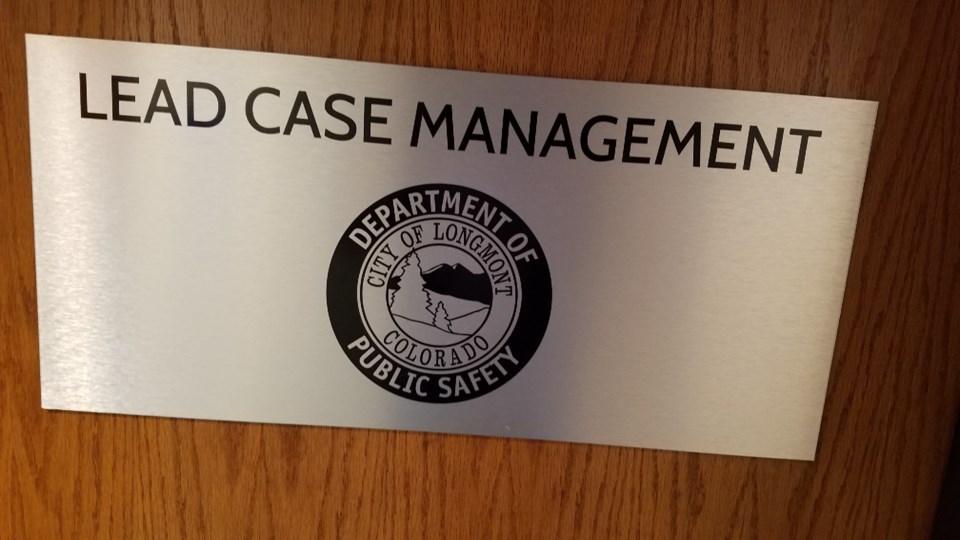A guy named Psycho tried to beat Lea to death with an iron pipe and probably saved her life.
Psycho's attack put both Lea and her husband in the hospital, where a Longmont police officer referred her to the city’s Law Enforcement Assisted Diversion, or LEAD program.
“If it hadn’t been for her getting me into LEAD, I’d probably be dead by now,” said 39-year-old Lea, who was homeless at the time of the attack. Lea, who asked that her last name not be used, is a recovering alcoholic and now lives in a one-bedroom apartment. She recently started a job, thanks to the referral work done by her LEAD case manager.
Started in 2018, LEAD is a new approach to dealing with chronic substance abuse disorders and untreated mental health issues, said Jeff Satur, deputy chief of Longmont’s Police Services Division.
The program appears to be paying off, Satur said. Those referred to LEAD are getting help that otherwise appeared out of reach for them while relieving the strain on Boulder County Jail and hospitals.
Of the 133 LEAD participants evaluated as part of a city review of the program, there was a 59% reduction in the number of illegal incidents after first contact with LEAD case managers.
There was a 50% reduction in the arrest rate after first contact with LEAD,33% were not arrested again and 32% did not receive another summons after first contact, according to a city report on the program.
The city also says there was a 25% reduction in trips to the emergency room, especially for those who received peer counseling, according to the report.
Longmont City Council earlier this month approved two intergovernmental agreements with the Colorado Department of Health and Human Services to continue grant funding for both LEAD and its sister program CORE, an acronym for Crisis Outreach Response and Engagement.
Council’s decision was applauded by Satur, a staunch advocate of LEAD.
“I absolutely love LEAD,” Satur said. “This is a way for police officers and case managers to meet with people who have real problems on the street or wherever they live to get them real-life help.”
LEAD asks police officers to use their discretion to divert or refer an addicted individual to a case manager, who then assesses the person to see which recovery program fits best, Satur said.
Officers can divert any charge related to an underlying condition, not just possession charges. Such offenses might be shoplifting to support an addiction, trespassing or a disturbance as a result of intoxication, officials said.
“We strongly believe our police officers know our community the best and are the best judges of who is an appropriate referral into LEAD,” said Michelle Webb, manager of the Longmont’s Public Safety Diversion Programs.
Case managers are on call and often meet with police and the potential participant in the LEAD program. Case managers have as many as 40 community groups and agencies to draw on to provide help, Webb said.
Case managers, who work in the Department of Public Safety, use an outreach philosophy of meeting addicts where they live to help them rebuild their lives, Satur said.
“Just telling them to get an appointment to get help just doesn’t work,“ Satur said. “Maybe they aren’t in a position to make an appointment because of homlesseness or a mental health issue.
“This program fills the gap between what we are doing as police officers and what a mental health professional can do,” he said. “We meet them at the grassroots level.”
The officer that met Lea at the hospital the night she was beaten by Psycho, was respectful and refused to pass judgement on Lea’s life.
“She just said to me ‘There is a new program out there that I think might be able to help you,’” Lea said. “Her approach was ‘I think you can do better with your life.’”
The officer could have said ‘You need help because you are a bad person,’” Lea said.
The officer referred Lea to a LEAD case manager, who got her a phone and helped her get back on her feet, Lea said. Lea moved into housing provided by The Inn Between of Longmont, which also helps with life skills training.
Morgan Popek, Lea’s current peer case manager, said she and other case managers work with clients who are on the street or wherever they live to help them get services.
“We don’t care where a client has been, we are more concerned about where people are going,” Popek said.
Lea, who split with her husband, admits she has relapsed a few times but is marching on toward sobriety.
“I know I’ve stumbled a few times,” Lea said. “But I keep moving ahead and LEAD is giving me the opportunities I need.”



